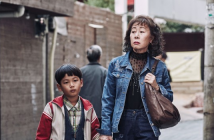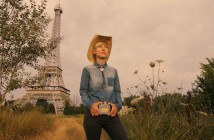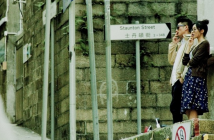
Little Men (dir. Ira Sachs, 2016)
Just two years after screening Love is Strange at the Berlin Film Festival in 2014, director Ira Sachs returned with his latest film to the festival, this year to the Generation section. After Love is Strange and Keep the Lights On, Little Men is the third film in a row that is New York-centric and explores friendship as well as financial struggles. After his father passes away, Brian (Greg Kinnear) and his family, including his teenage son Jake (Theo Taplitz) move to Brooklyn when he inherits his father’s house. Jake immediately befriends Tony (Michael Barbieri) whose mother Leonor (Paulina Garcia) rents the street-level shop in their new house. She used to be very close to Jake’s grandfather and did not have to worry about financial problems concerning renting out the shop. Unlike his father, Brian, who is a struggling theater actor, wants to sign a contract and collect a monthly payment for renting out the shop to Leonor. While their parents are fighting over business matters, Jake and Tony become best friends and both of them decide to apply to study at La Guardia High School of the Performing Arts – Jake wants to become a painter, Tony an actor. Eventually the two boys will however be affected by their parents disagreement, threatening their newly established friendship. Little Men is a wonderful, intimate film quietly observing teenage friendship and growing up while it takes its teenage characters very serious. It also concentrates on familiar issues from Sachs’ previous films such as social classes but it further discusses the increasing problem of gentrification in a neighborhood like Brooklyn.
I talked to Ira Sachs at a roundtable in Berlin where he talked about New York, especially Brooklyn, and the general themes of the film as well as his collaborations with his co-writer and composer.
Did the fact that you have children yourself influence you somehow in making this film, choosing this particular subject?
Sure. I think my films always come from things that I am interested in at that moment when I begin to make them. The questions of being a parent and what we impart upon our children and how we teach them values or how we have conflict in how we teach them values is very interesting to me. As well as being a son and thinking about generations passing and how we then become the ones who are sort of responsible for ourselves in a different kind of way. I think the fact that the film begins with Greg Kinnear’s character losing his father and having to see “Who am I? What do I care about? What is important to me?” is something that is relevant as a middle-aged man.
There is also a difference in “do as they say” and “do as they do”.
Yes, someone actually said that to me, I think it was my cinematographer from Love is Strange who said to me: “Kids learn by what you do, not by what you say.” What’s interesting in drama is how you respond to problems and that says a lot about us. I try really not to judge decisions. As soon as you bring in the questions of money everyone’s choices become very different. People have these abstract ideas of what they believe in and as soon as you threaten issues of financial security then everything shifts.
Except for growing up, Little Men is a lot about social classes. Why did you chose that?
I once read that the books of Jane Austen could be described as being about two subjects: love and money. And I feel like I connect to that, not because my films are very Austen-esque but because I think these are two places where you can learn a lot about characters and about a culture as well. For me there is so much drama in have people to do with family and relationships and then wrap themselves around issues of financial needs, basic human needs. A lot of my films in a way – this is my sixth feature – have been somehow about how people position themselves within a class or a culture and the problems of slipping away and possibly not being able to hold on to your space. My first film was about a Vietnamese African-American immigrant lead actor, so outsiders have also been really interesting to me. My husband is from Ecuador and he and his mother moved to New York when he was ten. He is a painter and ended up going to La Guardia High School of the Performing Arts, so the question is where you will actually find a foot into a culture – like any of us.
Friendship is a really big theme in the film as well as gentrification. Can you talk about the neighborhood that the story is taking place at and its developments?
I moved to New York in 1988 and I moved to a corner of Brooklyn and it was a primarily Italian neighborhood but it was a Dominican Street and I was the white-colored, educated gentrifier coming into that block. The Dominicans are all gone now from that block and the Italians are slowly dying out and what remains is a white middle class, maybe upper-middle class but white, an educated sort of creative class you might say. There are these challenges and fights over space, they clearly happen in any town, and to me they are both political issues and they are also just places of drama. There is distinctions in how neighborhoods are formed so this is sort of where the story came from. To me there is something really unique about childhood friendships that are presexual and yet they are romantic. I mean, this is certainly a romantic friendship and I think yesterday at the screening when I asked the audience who in the room could remember this one friendship that got away and like 250 people raised their hand. I find that it is a story that has resonance for a lot of people.

Little Men (dir. Ira Sachs, 2016)
Your previous two films were also set in New York and the city is a sort of character in itself, would you say this is a New York Trilogy in a way?
It is. There might be a – what is four called – quadrology? I mean, it is a trilogy and yet it is also a continuity of interest and I am generally interested in places that I know more about than other people. I happen to live in New York so I have an intimacy with that place which I think I can share through cinema but these films were all about the relationships between two males in all of these films of different generations. In a way I am talking about chapters in these three films.
The great works of art, that also includes your movies, have the capacity of showing something bigger within really intimate stories, and you do it. This trilogy – as we called it – tells actually a lot about America and you and your life.
I am an American artist, so there are things that are relevant. I feel my skill or my job is to make the ordinary extraordinary. You have to trust. This film is interesting because it shifts on a minor key. I would say this is my most rigorous film. I needed my closest attention because I think I needed to be very delicate with the story and also just continue to refine it. And it had to do a lot with my collaborations with my editors and my composer Dickon Hinchliffe, who I have worked with on a couple of other films. We really had a very deep connection around the subject of the film. He is a father of three and he got the film and the music is perfectly in line with the story.
And you also collaborated on the script?
I worked with Mauricio Zacharias. We made three films together – Keep The Lights On, Love is Strange and this film – and now we are working on a film about Montgomery Clift for HBO. So, we are working on that but we have been collaborating for these three films and he is also the godfather of my son. I think finding collaborators who become forms of family is necessary.
How does this process of collaborating in writing work?
We spend a couple of weeks or maybe a month or two watching movies and talking about our lives. A lot of my films are remakes in a way. This film is very much inspired by two films by Ozu, one was called I Was Born But… and then he remade his own film, which is Good Morning. Both films are about children who go on strike and they are wonderful movies. That idea is what we took. Once we come to the priority of the story and the set of characters, then Mauricio goes off and writes the first draft. Once that draft is done, I start coming in as the filmmaker and co-writer and we go back and forth until it comes to a certain point and it is totally mine. It begins in a place where it is ours but once it is the film process it is my film, which doesn’t mean that I don’t consult him but you have to translate the words into something else.
You also collaborated again with your composer Dickon Hinchliffe as you mentioned earlier. The score was really beautiful and it worked so well in creating the mood of the film. Can you talk about working with him?
This is our third film together. We worked together on a film called Forty Shades of Blue and another film called Married Life. I admired Dickon’s work with Claire Denis [on Vendredi Soir], a French filmmaker. Dickon started out in a band called Tindersticks and Claire started to work with them, which included a movie called Trouble Everyday. I loved his work and for my last two films I worked with the Archives of musicians who are no longer alive, so I didn’t have original scores, but I had Arthur Russell and I had Chopin. It was great to have this opportunity to work with Dickon again and from the beginning I think that he was able to bring an understanding of the childlike quality to the melody in the film but there is also musical sophistication, which I think is in line with what I was attempting to do with the movie, which is to keep it young and mature in the same breath. I also wanted it to be a movie that sort of appreciates the pleasure of cinema and it is not a realist film even though there is realist affirmatives but there are moments of cinematic joy in the film and the music is really a big part of that.
One of the scenes that was so brilliant was the one with Tony’s acting exercise. Was that scene already in the script like that or did the actors improvise?
That is Michael’s actual acting teacher Mauricio Bustamante and they had a real history which made that possible. That scene is very improvised. What I try to do in my films is usually to let things go in a couple of scenes. Most of the script is usually 90% scripted but then there are a few scenes where I like life to take over and that is one of them. I was wondering, both at Sundance and here in Berlin, people clapped at the end of that scene. Were you at the screening yesterday? Because the same thing happened, which is not something you see often in a film. I have been trying to figure out what gives permission as a group to clap and I think part of it is pleasure but I also think it is a bit like – do you every watch The Carol Burnett Show? It is an American show and it is a variety show. The woman, a hilarious comedian called Carol Burnett, often breaks character during her bits and she would start laughing and it is that great pleasure that the audience gets and they laugh with her. And I think in that scene Michael smiles. You are actually seeing that he is going like “Wow, this is really something” and the audience is like “It is really something!”. There is like a collective release that they have with the movie with the group of people in the movie. Technically, there were a lot of questions about that scene about where to cut it. Do we play it out? That particular shot we played to the end because it actually goes down and people get tired and then it comes up again and you are sort of forcing them through.



